Every marketing apparatus wishes they had a down bad white girl like Greta Gerwig on their roster. From the jump, Gerwig and Noah Baumbach’s big-budget BARBIE, starring Margot Robbie, has sounded like both a fever dream and a completely logical product in the current media landscape; Mr. Gerwig’s previous effort (an Amblin-indebted recreation of Don DeLillo’s seething WHITE NOISE) was a similarly extravagant boost in authorial scope that claimed radicalism through a corporate cannon. Shattering records across the globe, BARBIE has finally come to pass and, I won’t lie, it was a fuckin whirlwind at the AMC Lincoln Square on opening weekend. The studio-provided photo opp standee was on its last legs (I may or may not have fallen through it), the trademark Barbie Pink among attendees was blinding, and the glares at my fake ally ass were lethal. Who the fuck let this hairy ass bitch in and why is he trying to fit in by wearing pink, too?
While BARBIE will be totally linked to ‘Barbenheimer’ for the foreseeable future, there’s no denying that the current cultural moment belongs to this motion picture. In a TOP GUN: MAVERICK swoop, it’s become the defining cultural artifact of 2023 with five months still to go, but also much like TOP GUN: MAVERICK, it’s a miracle of timing and specific climate demands being met at a critical crossroads that a film with stylistic and ideological intentions beamed in from a different decade altogether has struck such a cord today. Like how OPPENHEIMER’s 70mm projected black-and-white images feel divinely transported from 1948, BARBIE is an instant relic from an alternate 2018, an American landscape where President Clinton has ratified the highest ever military investment in Israel with Bibi Netanyahu (they announce it with a VSCO post). We are living, laughing, and loving. Leslie Knope has handedly defeated Celia Cruz in the halls of the United States Mint to be the new face of the quarter. The liberals cry plastic tears. Cut a fascist and a Barbie bleeds. “How does something like this sneak through the studio system?” Brother, sister, where have you been?
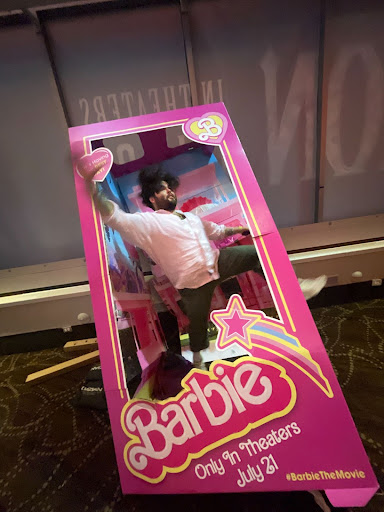
What are my cishet male bona fides for writing about BARBIE? There was one show-and-tell in kindergarten when, even after being dissuaded by my teacher, I smashed the glass ceiling and brought in the poor man’s CRASH BANDICOOT, the bluntly titled BARBIE: EXPLORER for PlayStation, to prove to my class that “girl games” were, in fact, as fun as “regular games,” but I’ve already gotten my flowers for that display of courage. I’m sure I can somewhat meet your list of demands requiring I name one Cheryl Dunye movie that isn’t THE WATERMELON WOMAN, that I can perfectly pronounce the titles of each of Demy’s features in their maiden tongue, and have a favorite Barbie spin-off (it’s Fairytopia), but I think I’ve got all of that beat. Why? Well, I buy stuff. I buy stuff because I love to own stuff. It fulfills me intellectually, but more importantly, emotionally. That’s about it. I have a passion for purchasing things, stuff, and more of both. I’m more uniquely qualified to analyze BARBIE than most people who grew up playing with Barbies. You may be thinking I’ve just been writing pure bullshit for the past three paragraphs, but what if I told you that maybe, just maybe, these are core concepts faced head-on by BARBIE?
—
What the fuck is this movie?
Well, it’s two projectors beaming at once, one playing an uber-corporate BEYOND THE VALLEY OF THE DOLLS-paced remake of ELF (with a heavy sprinkle of Bible school TOY STORY) that services its many celebrities, particularly Margot Robbie, a starlet caught in a six-year net of career jeopardy. If BARBIE flopped, it’d be a fire sale on Margot stock, an already flimsy investment after this recent run of qualitative and financial flops. With her own production banner (BARBIE’s very own LuckyChap) and project-choosy clout, the only explanation for AMSTERDAM, BABYLON, the ill-fated Harley Quinn trilogy, MARY QUEEN OF SCOTS, BOMBSHELL, DREAMLAND, and TERMINAL is a truffle pig with a busted snout. One of the final movie stars and her last decade has been in nothing but the dumbest fucking movies ever made—ones that were made singlehandedly because of her personal greenlight. Don’t get me twisted, I love Margot Robbie; there’s a sequence towards the end of BARBIE where Gerwig blasts a flurry of lights on Barbie’s face against a white background, and in every hue Robbie takes on the grandeur of a breathing Greek sculpture. This is a person who, despite her IMDB credits, was meant to be filmed with cameras for as long as she lives. But, God, I really pray the security of a billion-dollar-grossing BARBIE gets her back in the saddle.
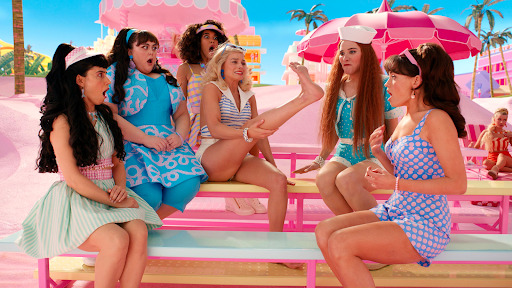
This point does not make me sound normal in day-to-day human interactions, but I still hold it: it’s a fascinating decision to cast the defining cinematic sex symbol of the last decade as Barbie, one of the 10 most popular American brands of all time, and perhaps the brand most inextricably associated with desire. The desire to look like her, to possess her belongings, to collect her coveted stares, and to desire her entire body as a personal commodity. To literally have Naomi Lapaglia’s legs as the stand-in for the primitivism of baby doll domestication expiring in the beckoning warpath of a tall hot blonde is such sublime casting that subtext becomes text and then subtext again. Then I remember that Rodrigo Prieto was the same cinematographer who established her image in THE WOLF OF WALL STREET and you realize Gerwig is more or less on the same page, or at least reading the same book. Robbie is stunning to the point of parody (narrator Helen Mirren points out as much in an oddly undercutting jab as Robbie performs her character’s painful climactic denouement), but it’s her effervescent woe that elevates the entire picture. Robbie’s Barbie is the primary fixture of her community, but when her unquestioned free will is revealed to be at the whim of a counsel of Gods, the actress skillfully navigates the tightrope of portraying the virgin unconscious. Ryan Gosling’s Ken gets a majority of the jokes and, truthfully, a more entertaining arc than Barbie as he (hysterically) discovers the joys of getting redpilled, but with the wonderful ways she navigates a Pee-Wee Herman breakfast routine, hard plastic pool water, or being point-blank called a fascist (“I don’t control the railways!”), you never doubt that Robbie is Barbie.
—
Oh, right, the other projector? It’s the one answering the question of how Gerwig managed something this aimless and light on its feet in the modern synergy conveyor belt: a livefeed of the thousands of emails Greta sent to Mattel and Warner executives with text-walls of blabbering, dialectical pitches grinding them down to a surrendering “FINE!” so long as she sandwiches her metaphysical doomer futzing within two all-white slices of brand catalog fantasia. You let the auteur think she’s getting away with something within the castle gates, meanwhile your selective “yes” and “no”s are guiding the vision into a marketer-curated mold that was decided on long ago. It’s an ingenious, insidious trick that the mega conglomerates played on Gerwig, and her viewers by proxy. BARBIE is not as far away from JOKER on the “IP as vessel for original filmmaking” spectrum as anyone would care to acknowledge. This is a film that begins with Lawyer Barbie filibustering on the nature of “plutocracy” in retaliation of corporations entitling themselves to the rights of citizens, and ends with a humanized Mattel product exultantly attending her gyno appointment. I cannot believe that’s a real sentence I just wrote. You could go 10,000 words doing Rap Genius annotations of each of BARBIE’s bars, but most of what Gerwig has to say is word salad, many of her film’s ideas outwardly contradicting ones brought up minutes earlier. It’d be nice if I could just have my face melted by the first projector’s dizzying girlboss farce on its own hyperpoptimistic aesthetic face, but, unfortunately, the “relax, it’s about dolls and having fun, stop overanalyzing!” movie does want you to listen to it! The entire last act is just seven floaty conversations with four different God figures that last 40 minutes each, with one particularly egregious one that fishes sympathy for the Mattel CEO and his merry band of board members.
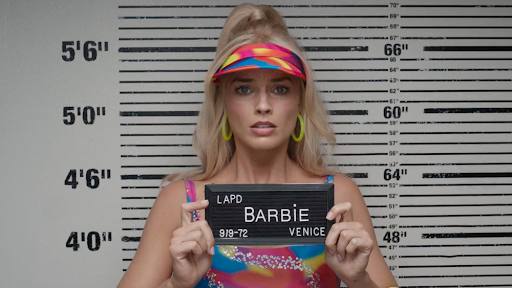
Most thoughtful are the film’s musings on the expectations of perfection—not so much in the Saturday morning cartoon refrains of how girls are expected to behave (how original), but largely in the likely accidental analogue to performing your gender to the point of “passing.” Far from a perfect one-to-one to coming out of the closet, but, in the film’s finale, Barbara Handler does end up manifesting a newly functional reproductive system in a body that feels more like home than the previous one ever did. BARBIE’s a bracingly modern film, one that doubles, nay, triples as an under-40 disquisition on life post-lockdown. We’re primed for art that itches at the grief of a daily lifestyle that balances climate disasters outside your window with calamitous headlines and backed up pick-up lines at Sweetgreen. A majority of it might be hot air, but there’s an existentialism driving BARBIE that functions for even the most hardened soul.
—
So, how does Greta serve in the gender battle? In the film’s crowning monologue, she explicates the contentions of womanhood, of the status of her achievements, the social contradictions and silent promises, and… And… And… Oh God, the monologue’s still going, and now it’s pausing for snaps. There’s a part of me that’s glad that anyone who needs to hear this monologue is able to hear it from the biggest movie of 2023, but also, this has been the same speech for ages. Where have *you* been? It’s fine, really, it’s fine, but America Ferrara’s monologue not coming from a Barbie does suck, because the last thing the Barbie movie needs is less things for the Barbies to do. It at least paves the way for a seemingly exciting plot deviation where the lone human in Barbieland deradicalizes the bimbofied Barbies by reciting a BLADE RUNNER-type cognitive dissonance exam and allowing human instinct to subsume their established notions of the regional hegemony, but it mostly boils down to kidnapping Barbies and giving them woman-ing lessons.
To get right to the cardinal sin of BARBIE, it gives men so much undue credit. Desperately lost in its own sauce, BARBIE implicitly pokes holes in the centuries’ long fight for feminism itself by presenting a shockingly in-depth case study where a subjugated masculine population of doting eunuchs turn their shit around in around two (2) hours flat. Gerwig and Baumbach really juice the patriarchy in this thing. The Kens are not defeated by the sheer unifying force of collective femininity, but by the Barbies using generic, patriarchal emotional deception to annoy the absolute fuck out of them. The Kens subsequently suffer a mass ego death, but were the Kens ever influential enough in Barbieland to launch a rebellion with leverage? I didn’t buy it. At this point, yeah, you should stop thinking so hard about the toy commercial movie for 8-year-olds and depressed 33-year-olds, but in favor of running a victory lap for “girly shit,” BARBIE focuses instead on the humanist range of emotions emanating from an ever-evolving natural world, until it very decisively stops doing that and conclusively decides that the primary advantage of femininity specifically is that you probably got to play with Barbie dolls as a kid. Early on, The Narrator jeers that “Thanks to Barbie, all problems of feminism and equality have been solved,” but then the film twists all its limbs into knots to softly make that very point!
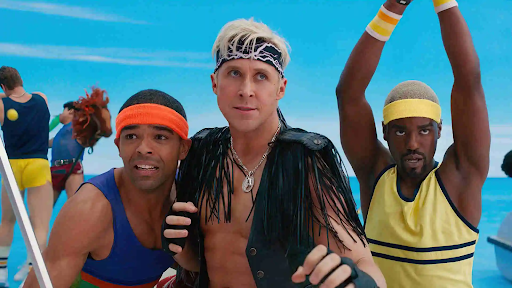
In BARBIE’s view of the patriarchy, men sort of… Own culture? Motherfucker, Greta, *you* would describe THE GODFATHER as a rich blend of Coppola’s aesthetic genius and the triumph of Robert Evans and the 70s studio system! You literally make movies filled with your secular, weird interests! Don’t give men credit by attributing all comprehension of arts & culture to them! I’ve wasted years of my life examining the socially constructed binary of “girl movies” and “boy movies” and the results yielded have overwhelmingly proven that we’re being morons by bottlenecking art and general existence like this. The amount of women that have overly explained IPAs to me.. It is a scary number. It’s hard to believe, but dainty little women also enjoy brewskis. There are femme physicists who love Lou Reed and being sluts on the weekend while remaining geniuses. You’re going to categorize “horses” as a thing that dudes like when horse girls are the ones who’ve driven up Mattel profits for generations?! How in the world are you going to set up the Kens as having rich understandings of their assorted hobbies and interests, while upholding the most leadened ball-and-chain myth of working girl syndrome?
—
In crucial ways, BARBIE has successfully bridged the binary gender gap in being a feminized bro movie that performs the same nostalgia baiting as any other decades-old property for little boys. I saw BARBIE with two women; after detailing the scenes where they were moved to tears (I’m surprised how widely that limp montage of home movies is resonating), they promptly moved on to discussing which Barbies they were planning to seek on Ebay. We did it, Joe, we turned the mid-20s woman into a divorcee after AVENGERS: ENDGAME. The appearance of the discontinued breast-growing Barbie is treated 20% like a SPIDER-VERSE comedic bit of useless trivia and 80% like Black Panther marching out of a portal. A social win for commerce! It’s not just “selling out” that makes Gerwig’s descent from indie queen to NARNIA caregiver so tragic (Barry Jenkins’ still-to-come LION KING prequel sort of bore the brunt of my misery on that front), it’s that the filmmaker behind LADY BIRD and LITTLE WOMEN—two profoundly moving emotional odysseys into the fluidity of sentimentality and how memory wraps around the passage of time like a python—has transitioned from dramatically splitting the atoms of the surrounding melancholy of our cultural obsessions to feeding the machine itself. It’s a Greta Gerwig film, but, my goodness, how lesser of a Greta Gerwig film this is.
Amidst all the bad faith panning of this stone-cold hit, you could prove that you’re not a misogynist for not enjoying BARBIE by headily broaching the various self-contrasting philosophies of a film that forces you to consider Proust sheerly because the movie just says “Proust” and walks away, but I was bored for way simpler reasons. Its grocery list of ideas are incuriously bludgeoning, it’s not very funny, the dancing sucks, Margot is an active character maybe upwards of four total times. and I came out of a Barbie movie most mesmerized by the Kens! How’d you manage to fuck that part up?! You were always going to be set up as some anti-men screed in the interminable culture war, so why not just… Be that? I’d take a smidge of female celebration, just a little bowl of it, sir. “Don’t call me ‘baby’” Tumblr feminism, instead? Okie-dokie.
Even just eight years prior, Gerwig and Baumbach were more likely to cook up something as toxically effective as Deborah Kaplan and Harry Elfont’s much maligned, self-immolating JOSIE AND THE PUSSYCATS adaptation, a sort of THEY LIVE through the lens of Nickelodeon’s THE AMANDA SHOW. Their approach—to secure somewhere around 200 brand deals in a scam effort to shit on all 200 of them on the heels of a haphazard IP rejuvenation—is almost too glib, inadvertently creating a blueprint that’s allowed so many Amazon, Disney, and now Warner Bros. products to have their self-critiquing cake and engorge themselves with it, too. Were JOSIE AND THE PUSSYCATS not a box office bomb that killed multiple careers, and a brand to boot, it’d probably have time to serve in the gulag, but it’s a pillar of genuine spite that was punished for leaving a gaping bite wound in the hand that fed it. Well, the prison gates are now finally open, and the wound has been mended; the beast has a beating heart, billions of dollars, and, worse than ever before, a self-parading sense of dull irony. The doll is immortal.





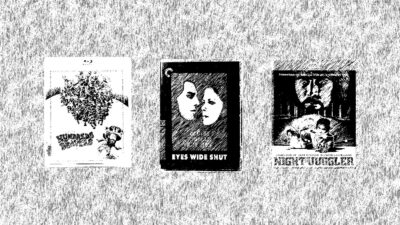









Comments